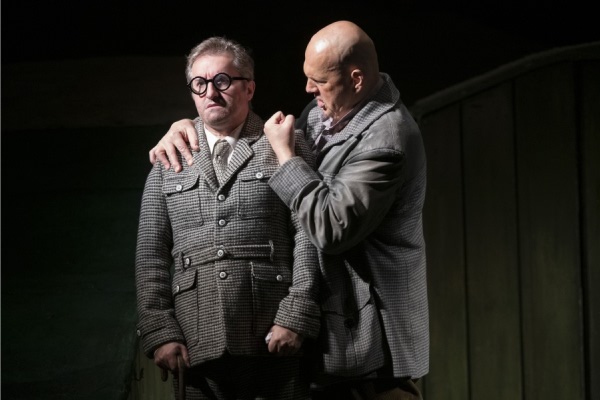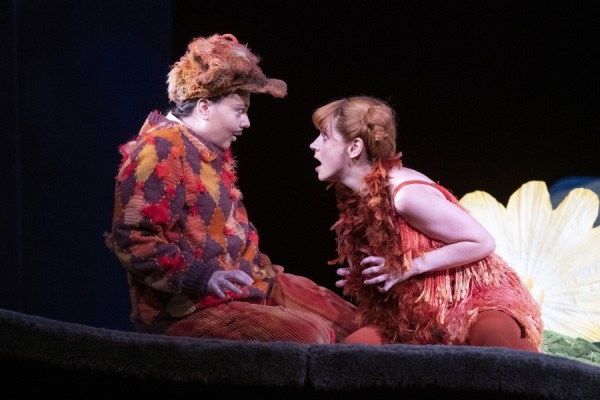|

Aoife Miskelly as the captured Vixen with Michael
Clifton Thompson as the Cockerel with his soon to be late hens.
Pictures: Richard Hubert Smith
The Cunning Little Vixen
Welsh National Opera
*****
On one hand it is a whimsical bucolic
folk tale, an everyday story of country folk and woodland creatures, on
the other it is a fable with political overtones, such as when the oh so
comfortable Badger tells the “flea infested vixen” in no uncertain terms
to go away.
This is a respectable area he tells her, in that
superior air seen in the more privileged mammal in the more exclusive
setts, only to be told: “Being rich does not make you respectable!” – it
also doesn’t make you safe as the vixen liberates his comfortable home –
chucking out into the snow and moving herself in as the less fortune
creatures chant plutocrat at the departing brock played by Lawrence
Cole.
And there is a moment when the Vixen and forest
creatures are struggling for food and she cries “How can mankind be so
greedy, stuffing themselves with food and I am hungry”. A cry that can
mean many things in many ways.
We open though with the vixen cub playing and
chasing a frog with both running into a rather bluff forester who
captures her as a pet – and we then find the cub as a beautiful young
vixen tied up in a yard with the forester’s old dog, sung by Helen
Greenaway, who is bemoaning her life without sex.
Our vixen is also inexperienced in this area, but
she knows what she has seen and heard in the forest . . . I bet you
didn’t know starlings were right old gossips and the young ones are
right old slappers. That gives you something to think about when you
fill the bird feeders.

Peter Van Hulle as the Schoolmaster and
Claudio Otelli as the Forester
The forester, sung by Austrian Claudio Otelli
with his rich bass-baritone, is none too bright, putting a flock of
chickens in with the fox and dog – which sees the fox, desperate to
escape, trying to lead a female rebellion, pleading with the hens to
overthrow their pompous leader a “right-wing conservative” cock – and
much as I am tempted to drift into contemporary comment, we will leave
that one there.
It is a lovely performance from Michael
Clifton-Thompson as the cockerel and his hens led by Meriel Andrew, as
they peck, cluck and strut around the stage. Alas, hens and foxes don’t
really get on, and when revolution fails, the vixen resorts to more
basic methods, killing the entire fowl flock and using them as a
diversionary stepping-stone to jump the wall and escape back to the
forest.
The Forester has mixed feelings about the escape,
He has a love hate relationship with the fox, in some ways sorry to see
her go, in others it’s good riddance – or perhaps he is glad she has her
freedom.
Irish soprano Aoife Miskelly is a delight as the
vixen - attractive, vibrant, full of life with a cheeky charm and with a
lovely, clear, pure voice.
You genuinely feel sorry for her when she meets
her end at the hands of the not very likable poacher Harašta, sung by
bass David Stout.
Harašta is unpopular on every level. For a start
he is a poacher, so the forester is after him, but even worse, he is set
to marry Terynka.
Who she? you ask. She is the gypsy girl lusted
after by the Forester, the schoolmaster, sung by tenor Peter Van Hulle,
and the parson, bass, Wojtek Gierlach, as they help boost the profits of
the local inn on what appears to be a nightly basis.
We never actually meet the young, presumably,
lady but the trio certainly have the hots for her . . . in a more mature
restrained way.
In various states of inebriation on their
staggering way home, the schoolmaster tells a bush he thinks is the
gypsy charmer, that he loves her, while the parson, tells how Terynka is
stirring the feelings he had about a temptress in his youth.

Lucia Cervoni as the Fox and Aoife
Miskelly as the Vixen
Meanwhile, away from the humans, what has
happened in the fox world. Well, the vixen, enjoying her freedom, and
new hme, has come across another fox, this time a dog, sung by Candian
mezzo-soprano Lucia Cervoni and a sweet, naïve romance develops.
Now as this was in 1924, before Sky and even TV,
people, and foxes, had to make their own entertainment, so we soon had
eight fox cubs. Here though, we are asked, as we are several times, to
see animals facing a human dilemma. The Vixen is unsure about premarital
sex and what orher creatures will think, so the pair have to get married
to stop tongues – or beaks as it is the starlings again – wagging.
So with Mr and Mrs Fox and their efforts to
populate the world underway, everyone is living happily ever after, or
at least until Harašta and his shotgun show up nd the Vixen’s life is,
literally, blown apart.
The forester realises his vixen is dead when
Harašta turns up at his wedding to Terynka with her red coat and to lose
his gypsy girl, who he never actually had, and the vixen, who he
couldn’t actually keep, was all a bit too much for him.
So, with age weighing heavy as he realises most
of his life is now behind him he wanders off to the forest and sits down
for a troubled sleep, only to be confronted by a frog, and not only
that, it is the grandson of the frog chased by the vixen those many
years ago.
It is a moment that brings home to him the
eternal circle of life and death, a moment that brings him calm and
peace and allows him to sleep easy – or does he die with a sort of
contentment. We will never know.
As operas go this is different to the classics
with soaring scores and powerful arias. It is based on a Prague
newspaper’s illustrated story series about a wily vixen and Leoš Janáček
took that and added Morovian folk tunes to create an opera which can be
performed as anything from children’s entertainment, in the same vein as
Peter and the Wolf, or as a tragic opera with the vixen and her death
taking on deeper, darker significance.
WNO treat it as whimsy. It is fun with a cartoon
feel to the clever, undulating set from the late, legendary Maria
Björnson. It is a set that splits to reveal the forester’s yard, the inn
and anything else, beautifully lit by Nick Chelton.
It is an opera that also brings in dance with
various creatures from mosquitoes to butterflies, birds to squirrels,
all in lovely costumes, with plenty of children and even moments of
ballet in a production which dates back to 1980 – yet is still as fresh
as ever.
As always, the excellent WNO Orchestra under
celebrated Czech conductor and WNO Musical director Tomáš Hanus add
greatly to the enjoyment of the evening in an opera directed by former
WNO artistic director David Poutney.
It’s different and delightful,
Roger Clarke
07-11-19
WNO
|

